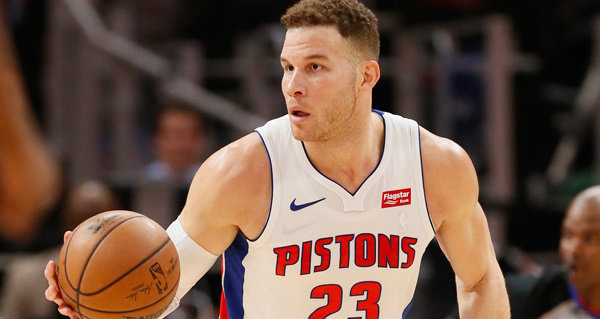Blake Griffin’s got a thing with his knee. It’s been the great running disappointment of his career, that his remarkable body doesn’t hold together all that well. There’s always something—a strained quad, a busted toe—and it often befalls him toward the end of the NBA calendar. The knee issue is mild, as late-in-the-year Blake Griffin injuries go. (A handful of his seasons have concluded with him totally out of commission.) Dwane Casey wondering aloud if his star forward is going to play in the Pistons’ playoff opener against the Bucks on Sunday scans more as a coach protecting his star—subtext: forgive him if he looks a step slow out there—than a real possibility. Blake has worked too hard to drag an otherwise mediocre Detroit squad into the postseason. If he can stand up, he’ll start in Game 1.
Besides, this Milwaukee series is his… reward? It’s not likely to be pretty, especially if Blake’s not operating at full capacity. The Bucks are simply a lot better than the Pistons, and a sweep wouldn’t surprise anyone. The fun thing about making the playoffs as an eight-seed is more the process of winning 40-some games over the course of the regular season; the actual playoff run is usually quick and unpleasant. Perhaps the best way to describe the Pistons nabbing the final spot in the East is that it is Blake Griffin’s achievement—and not all achievements are major, or easy to appreciate. On a scale of Releasing Supreme Clientele to Fixing The Sink Because It Was Really Starting To Smell, Blake’s work trends toward the latter.
And there’s a misery clinging to him, the done-dirtiness of being traded out of Los Angeles just months after being told he would someday retire a Clipper, the scraggly beard and slightly sunken eyes, having to put up with Reggie Jackson, a Catholically glum sense of duty. His competitiveness has been thrown into stark relief this season, which is a way of saying everything looks difficult and he seems annoyed by it. When he returned to the Staples Center in January, he snubbed Steve Ballmer. Hell, he snubbed Ralph Lawler in Detroit last year, the Clippers lovable play-by-play legend revealed during the game’s broadcast. Blake scored 44 sullen points that night, insisting upon both his pain and his strength.
The elemental appeal of Blake Griffin’s game used to be the improbable balance between heavy and light. He was built like a cast-iron stove but could leap and maneuver in ways that didn’t make sense. With Blake, they made the whole plane out of the black box and it still flew. As injuries have chipped away at his athleticism, the heaviness has taken over. He can get where he needs to go and he can outmuscle just about anybody, but much like post-prime Vince Carter, he compares unfavorably with a self that’s long gone. Blake Griffin as a sensation has been a dead concept for a few years, and Blake Griffin the guy just turned 30 last month. That he comes off weary and irritated–in the wind-bitten midwest, in a new arena that won’t fill —is only understandable.
This has arguably the best season of his career, by the way. Arguably in the sense that you can construct an argument for it, not that it’s a correct one. (The numbers are there, but c’mon, he was Charles Barkley meets Diet LeBron in 2014.) Blake has everything except what he can’t get back. He can shoot the three, bring the ball up the floor and play point forward, punish scrawnier defenders on the block, find shooters when the double-team arrives and find cutters whenever he wants. Overwhelming ability has given way, inevitably, to polish. If there is something deeply satisfying about watching Blake play these days—and to be clear, despite the gloomy overtones, there certainly is—it’s the extent to which he’s mastered his craft. The less flashy things he has always been good at are more apparent than ever, and the skills he has developed to compensate for being merely pretty damn athletic come off as inspired bits of invention.
Vince Carter is more notable now for the years he spent as a shockingly effective old man role player and all-around ace teammate, but he had a productive post-prime too, alongside Jason Kidd and Richard Jefferson on those mid-aughts Nets teams that were never quite as dangerous as they seemed like they should be. In his age 31 season, Carter scored 25 points a night with five rebounds and five assists. Did we properly recognize that at the time? If memory serves, most folks were out on Vince for forcing his way out of Toronto. Those Nets went 41-and-41, crashed out the playoffs to the Cavs team that got swept in the Finals. Vince properly fell off after that, putting up empty numbers on lottery teams, then leaving for Orlando a couple years later.
The Pistons have finished the season 41-and-41. Blake’s stats: 24.5 PPG, 7.5 RPG, 5.4 APG. This has been a great, sustained performance from an all-timer who’s not quite and will never again be what he was in his mid-20s. If it’s shot through with some grief and anger, if it feels slightly sad, well, the context is the context, and it provides all the answers you need as to why Blake’s not smiling much. But whether he feels satisfied or not, his season has been extraordinary and he deserves some happy recognition as it nears its conclusion. Hopefully he’ll be able to make a fine account of himself against the Bucks, however the Pistons ultimately fare in that series. Up until now, Blake has been everything he can be, and that’s proven to still be a lot.



